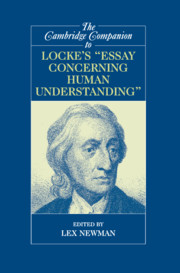Book contents
- Frontmatter
- Introduction
- 1 The Intellectual Setting and Aims of the Essay
- 2 Locke’s Polemic against Nativism
- 3 The Taxonomy of Ideas in Locke’s Essay
- 4 Locke’s Distinctions between Primary and Secondary Qualities
- 5 Power in Locke’s Essay
- 6 Locke on Substance
- 7 Locke on Ideas of Identity and Diversity
- 8 Locke on Ideas and Representation
- 9 Locke on Essences and Classification
- 10 Language, Meaning, and Mind in Locke’s Essay
- 11 Locke on Knowledge
- 12 Locke’s Ontology
- 13 The Moral Epistemology of Locke’s Essay
- 14 Locke on Judgment
- 15 Locke on Faith and Reason
- Bibliography
- Index of Names and Subjects
- Index of Passages Cited
10 - Language, Meaning, and Mind in Locke’s Essay
Published online by Cambridge University Press: 28 July 2007
- Frontmatter
- Introduction
- 1 The Intellectual Setting and Aims of the Essay
- 2 Locke’s Polemic against Nativism
- 3 The Taxonomy of Ideas in Locke’s Essay
- 4 Locke’s Distinctions between Primary and Secondary Qualities
- 5 Power in Locke’s Essay
- 6 Locke on Substance
- 7 Locke on Ideas of Identity and Diversity
- 8 Locke on Ideas and Representation
- 9 Locke on Essences and Classification
- 10 Language, Meaning, and Mind in Locke’s Essay
- 11 Locke on Knowledge
- 12 Locke’s Ontology
- 13 The Moral Epistemology of Locke’s Essay
- 14 Locke on Judgment
- 15 Locke on Faith and Reason
- Bibliography
- Index of Names and Subjects
- Index of Passages Cited
Summary
Locke's Essay concerning Human Understanding is a philosophical landmark devoted to understanding the nature and limits of human knowledge in terms of the concept of an idea. The term 'idea' plays such an important role in the Essay that contemporary critics derided it for following a “new way of ideas” that would “promote scepticism and infidelity” (W IV: 129-30). Locke himself was apologetic for his frequent use of the term 'idea', but he believed that he “could not avoid frequently using it” (E I.i.8: 47). Locke writes, “[m]y new way by ideas . . . may . . . comprehend my whole Essay,” but he adds that this “new way of ideas, and the old way of speaking intelligibly, was always, and ever will be the same” (W IV: 134, 430). Locke uses the concept of an idea to develop accounts of sensation, reflection, perception, memory, and knowledge, which became the central themes that exercised his successors and critics such as Berkeley, Hume, and Reid.
But there is another distinctive feature of Locke's Essay. It also includes a turn to language that has a significant place in the history of philosophy. Locke not only relies on the concept of an idea to explain perception and knowledge, but also uses it to develop a theory of language. After a critique of the doctrine of innate ideas in Book I and an extensive discussion of the origins and the classification of ideas in Book II, Locke turns to language in Book III, which begins with a chapter ‘‘Of Words or Language in General.’’
- Type
- Chapter
- Information
- Publisher: Cambridge University PressPrint publication year: 2007
- 8
- Cited by



